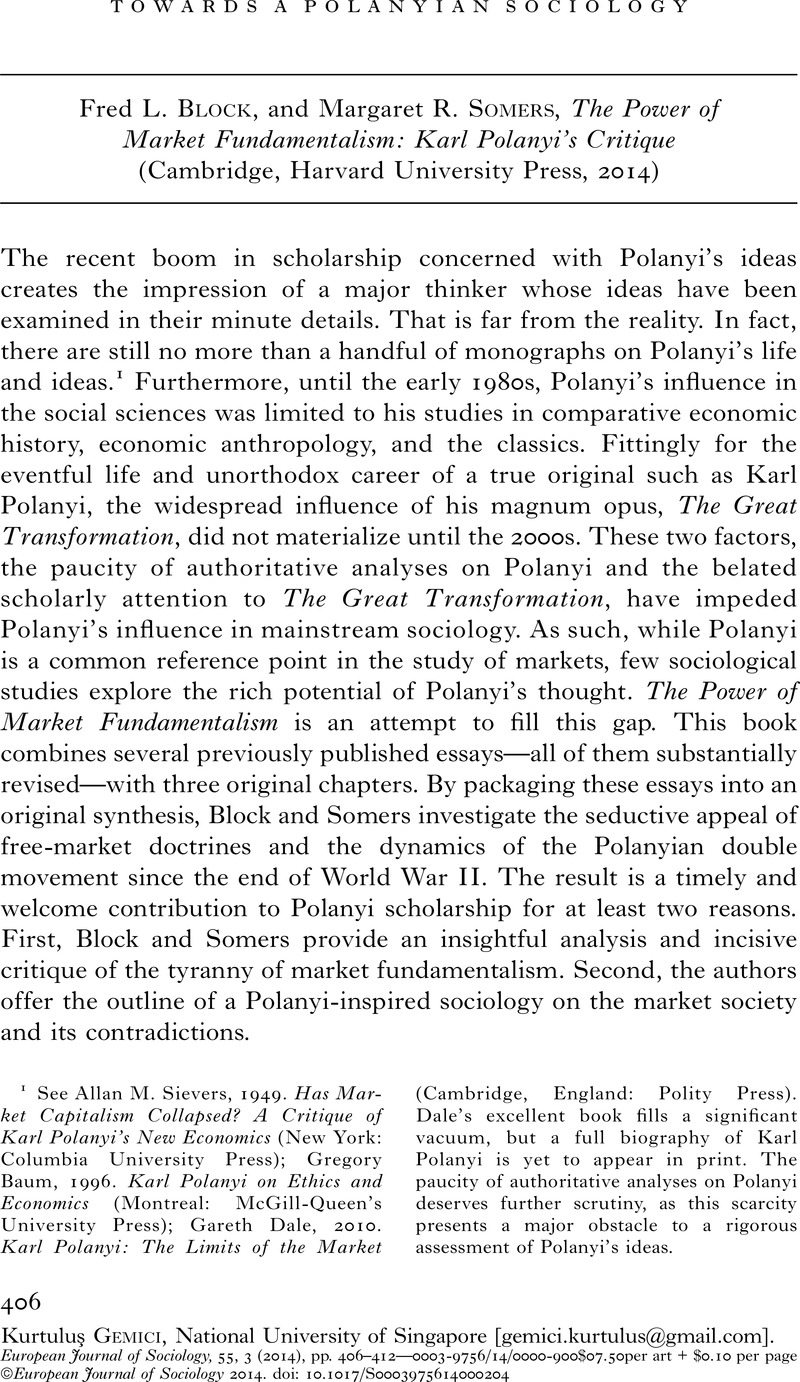No CrossRef data available.
Article contents
Towards a Polanyian Sociology - Fred L. Block, and Margaret R. Somers, The Power of Market Fundamentalism: Karl Polanyi’s Critique (Cambridge, Harvard University Press, 2014)
Published online by Cambridge University Press: 16 January 2015
Abstract

- Type
- Book Reviews
- Information
- European Journal of Sociology / Archives Européennes de Sociologie , Volume 55 , Issue 3 , December 2014 , pp. 406 - 412
- Copyright
- Copyright © A.E.S. 2014
References
1 See Allan M. Sievers, 1949. Has Market Capitalism Collapsed? A Critique of Karl Polanyi’s New Economics (New York: Columbia University Press); Gregory Baum, 1996. Karl Polanyi on Ethics and Economics (Montreal: McGill-Queen’s University Press); Gareth Dale, 2010. Karl Polanyi: The Limits of the Market (Cambridge, England: Polity Press). Dale’s excellent book fills a significant vacuum, but a full biography of Karl Polanyi is yet to appear in print. The paucity of authoritative analyses on Polanyi deserves further scrutiny, as this scarcity presents a major obstacle to a rigorous assessment of Polanyi’s ideas.
2 For these debates, see Dale (2010, ch. 4).
3 Important examples include the notion of embedded liberalism (John G. Ruggie, 1982. “International Regimes, Transactions, and Change: Embedded Liberalism in the Postwar Economic Order”, International Organization 36: 37-415), the embeddedness of economic action (Mark Granovetter, 1985. “Economic Action and Social Structure: The Problem of Embeddedness”, American Journal of Sociology 31: 481-510), and special vs. general-purpose money (Viviana Zelizer, 1989. “The Social Meaning of Money”, American Journal of Sociology 95: 342-77).
4 For a summary of the ongoing debate, see Greta R. Krippner and Anthony S. Alvarez, 2007. “Embeddedness and the Intellectual Projects of Economic Sociology”, Annual Review of Sociology 33: 219-240; Kurtuluş Gemici, 2008. “Karl Polanyi and the Antinomies of Embeddedness”, Socio-Economic Review 6: 5-33; and 1. Jamie Peck, 2013. “For Polanyian Economic Geographies,” Environment and Planning A: 1545-1568.
5 The authors prefer market fundamentalism to neoliberalism, laissez-faire, and free-market ideology. With this term Block and Somers capture a crucial aspect of the ideologies they study critically. Neoliberalism and free-market doctrines are not simply a set of economic ideas; they are also the altar of a church with its own high priests, martyrs, and an astonishingly large number of zealots.
6 See Ayşe Buğra and Kaan Ağartan, eds., 2007. Reading Karl Polanyi for the Twenty-First Century: Market Economy as a Political Project (New York, NY: Palgrave Macmillan).
7 Fred Block, 2012. “Varieties of What? Should We Still Be Using the Concept of Capitalism?”, Political Power and Social Theory, 23: 269-291.
8 See Nina Bandelj, 2012. “A Polanyian Analysis of Capitalism: A Commentary on Fred Block”, Political Power and Social Theory, 23: 293-302; 1. Ho-Fung Hung, 2012. “Marx, Weber, and the ‘Ceaseless Accumulation of Capital’?”, Political Power and Social Theory, 23: 303-310; 1. Wolfgang Streeck, 2012. “On Fred Block, Varieties of What? Should We Still Be Using the Concept of Capitalism?”, Political Power and Social Theory, 23: 311-321.




